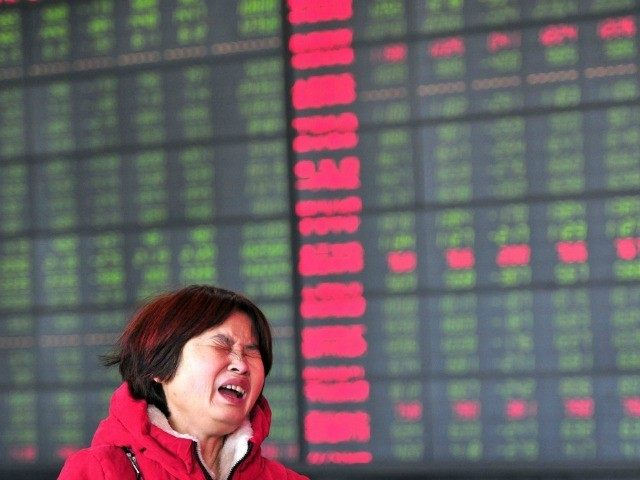China’s Shanghai futures market crashed by the maximum 10 percent, and trading was suspended on January 19th, while Shanghai Composite Index fell by 7.7 percent. Both events were the worst day of trading since shortly after the Lehman Brothers bankruptcy launched the financial crisis six years ago.
Such an event in the U.S. would be epic, because Americans have 70 percent of household wealth in financial assets, but in China, 75 percent of household wealth is in real estate. If a real estate crash took place in China, it could set off the type of “black swan” event to cause an ugly international panic.
The sudden air pocket was blamed on actions by Chinese securities and banking regulators to bar three retail brokerage firms from lending more money to customers who want to buy stocks on margin and also for the regulators increasing the minimum margin down payment to open new futures contracts. With no more ability to buy on leverage, speculators had no one to sell to, and futures index prices plunged and were suspended.
Only a select few in China, who are very rich, play the stock market. While most stock markets around the world doubled from 2009 to 2013, China’s Shanghai stock index was the worst performer with no gain. But in 2014, China’s stock index was the best performer with a 60 percent gain and continued its winning ways until Monday night’s wipeout. The crash was so violent that various stock trading “circuit breakers” were triggered that halted further trading.
But the real risk in China is that the fifteen-year real estate bubble that has seen residential prices increase by over 1,000 percent has popped and prices are headed down. Despite a gross national product (GDP) of only about $8 trillion, China is planning to build a record $5.2 trillion more real estate in a market with declining prices.
Chinese officials know that 15 percent of their GDP is directly related to construction, and 35 percent of the economy is indirectly related through site preparation, materials, furniture, insurance, and other services. Any slowdown in construction would quickly tank the economy and cause tens of millions of unemployment. That is why China is building.
Asian markets were on edge on Tuesday morning, ahead of the release of data that will show China’s economy grew at the slowest pace in 24 years last quarter, despite the People’s Bank of China in 2014 funding the biggest credit creation year since Lehman Brothers debacle in 2008.
China’s first “satellite city,” that was built to look like “Paris,” was declared a “ghost city,” and developer Zhejiang Guangsha was reportedly “carted away by the authorities” on Monday morning. With a replica of the Eiffel Tower and ten thousand Parisian-style villas built to attract the country’s wealthy, the “town now has a population of just two thousand people as many people are not able to afford the houses in this area,” according to the Macro Business Blog.
Despite the fact that China’s equity markets have grown to overtake Japan’s as the world’s second largest market in 2014, total capitalization of the three primary markets is only about $5.1 trillion. By comparison, outstanding corporate and local government debt that often financed real estate is at least five times larger, about $26 trillion, according to Stratfor’s John Minnich.
Monday night’s stock market smash did hurt millions of Chinese small investors and day traders who account for the bulk of market trading. But with one in five homes in China’s cities already vacant (55 million) according to the Wall Street Journal, a real estate panic and crash could set off the same type of event as the bankruptcy of Lehman Brothers.

COMMENTS
Please let us know if you're having issues with commenting.